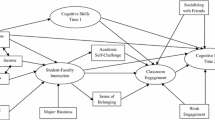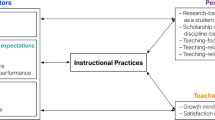Abstract
Research on the faculty impact on students’ academic achievement has been disproportionately confined to the context of countries with developed higher education systems. Few studies have been undertaken in the developing world like Cambodia. This study employed hierarchical linear modeling to examine the relationships between faculty behaviors and the academic achievement of university students in Cambodia, using the data of 923 first-year students from nine universities in Phnom Penh City. Results indicated that faculty behavior, namely their support and feedback to students, was a unique factor that had a strong and positive influence on students’ academic achievement. Its effect was the same for all students regardless of their pre-university academic experience and geographical origin and partially moderated by student engagement in time spent on course-related tasks outside the classroom, assigned homework/tasks, class participation, and class preparation. Contrary to existing findings from faculty impact studies, no relation was found for faculty’s instructional organization and clarity or classroom practices that challenge students on academic achievement. Practical implications for assessment policies and instructional practices are discussed.
Similar content being viewed by others
References
Bjorklund, S. A., Parente, J. M., & Sathianathan, D. (2004). Effects of faculty interaction and feedback on gains in student skills. Journal of Engineering Education, 93(2), 153–160.
Bray, G. B., Pascarella, E. T., & Pierson, C. T. (2004). Postsecondary education and some dimensions of literacy development: An exploration of longitudinal evidence. Reading Research Quarterly, 39(3), 306–330.
Cabrera, A. F., Colbeck, C. L., & Terenzini, P. T. (2001). Developing performance indicators for assessing classroom teaching practices and student learning: The case of engineering. Research in Higher Education, 42(3), 327–352.
Carini, R. M., Kuh, G. D., & Kleint, S. P. (2006). Student engagement and student learning: Testing the linkages. Research in Higher Education, 47(1), 1–32.
Chapman, D. W. (2009). Education reforms and capacity development in higher education. In Y. Hirosato & Y. Kitamura (Eds.), The political economy of educational reforms and capacity development in Southeast Asia: Cases of Cambodia, Laos and Vietnam (pp. 91–109). Dordrecht: Springer.
Chen, C. Y., Sok, P., & Sok, K. (2007). Benchmarking potential factors leading to educational quality: A study on Cambodian higher education. Quality Assurance in Education, 15(2), 128–148.
Chet, C. (2006). Cambodia. In UNESCO, Higher education in South-East Asia (pp. 13–33). Bangkok: UNESCO Bangkok.
Chet, C. (2009). Higher Education in Cambodia. In Y. Hirosato & Y. Kitamura (Eds.), The political economy of educational reforms and capacity development in Southeast Asia: Cases of Cambodia, Laos and Vietnam (pp. 153–165). Dordrecht: Springer.
Chhinh, S., & Tabata, Y. (2003). Teacher factors and mathematics achievement of Cambodian urban primary school pupils. Journal of International Development and Cooperation, 9(2), 29–41.
Davis, T. M., & Murell, P. H. (1993). A structural model of perceived academic, personal, and vocational gains related to college student responsibility. Research in Higher Education, 34(3), 267–289.
Devlin, M., & Samarawickrema, G. (2010). The criteria of effective teaching in a changing higher education context. Higher Education Research and Development, 29(2), 111–124.
Duggan, S. J. (1997). The role of international organisations in the financing of higher education in Cambodia. Higher Education, 34(1), 1–22.
Field, A. (2009). Discovering statistics using SPSS (3rd ed.). Dubai: Oriental Press.
Ford, D. (2013). Cambodian higher education—Subprime degrees? International Higher Education, 70, 15–16.
Greene, T. G., Marti, C. N., & McClenney, K. (2008). The effort-outcome gap: Differences for African American and Hispanic community college students in student engagement and academic achievement. The Journal of Higher Education, 79(5), 513–539.
Heng, K. (2013). The relationships between student engagement and the academic achievement of first-year university students in Cambodia. The Asia-Pacific Education Researcher. doi:10.1007/s40299-013-0095-8.
Kahu, E. R. (2013). Framing student engagement in higher education. Studies in Higher Education, 38(5), 758–773.
Kuh, G. D. (2003). What we are learning about student engagement from NSSE. Change, 35(2), 24–32.
Kuh, G. D., Cruce, T. M., Shoup, R., Kinzie, J., & Gonyea, R. M. (2008). Unmasking the effects of student engagement on first-year college grades and persistence. The Journal of Higher Education, 79(5), 540–563.
Kuh, G. D., & Hu, S. (2001). The effects of student-faculty interaction in the 1990s. The Review of Higher Education, 24(3), 309–332.
Kuh, G. D., Pace, C. R., & Vesper, N. (1997). The development of process indicators to estimate student gains associated with good practices in undergraduate education. Research in Higher Education, 38(4), 435–454.
Kwok, K., Chan, S., Heng, C., Kim, S., Neth, B., & Thon, V. (2010). Scoping study: Research capacities of Cambodia’s universities. Retrieved July 28, 2011, from http://drfcambodia.net/profiles/blogs/scoping-study-research.
Marsh, H. W., & Dunkin, M. J. (1997). Students’ evaluation of university teaching: A multidimensional perspective. In R. P. Perry & J. C. Smart (Eds.), Effective teaching in higher education: Research and practice (pp. 241–319). New York: Agathon Press.
Marshall, J. H., Chinna, M. U., Nessay, P., Ngo Hok, U., Savoeun, V., Tinon, S., et al. (2009). Student achievement and education policy in a period of rapid expansion: Assessment data evidence from Cambodia. International Review of Education, 55(4), 393–413.
Ministry of Education, Youth and Sport. (2005). Education strategic plan 2006–2010. Phnom Penh: Author.
Ministry of Education, Youth and Sport. (2013). Educational congress report for the academic Year 2011–2012 and directions for 2012–2013. Phnom Penh: Author.
Neau, V. (2003). The teaching of foreign languages in Cambodia: A historical perspective. Language, Culture and Curriculum, 16(3), 253–268.
Ngo, F. J. (2013). The distribution of pedagogical content knowledge in Cambodia: Gaps and thresholds in math achievement. Educational Research for Policy and Practice, 12(2), 81–100.
Pace, R. (1990). The undergraduates: A report of their activities and progress in college in the 1980’s. Los Angeles: University of California.
Pascarella, E., Edison, M., Nora, A., Hagedorn, L., & Braxton, J. (1996). Effects of teacher organization/preparation and teacher skill/clarity on general cognitive skills in college. Journal of College Student Development, 37, 7–19.
Pascarella, E. T., Pierson, C. T., Wolniak, G. C., & Terenzini, P. T. (2004). First-generation college students: Additional evidence on college experiences and outcomes. The Journal of Higher Education, 75(3), 249–284.
Pascarella, E. T., Salisbury, M. H., & Blaich, C. (2011). Exposure to effective instruction and college student persistence: A multi-institutional replication and extension. Journal of College Student Development, 52(1), 4–19.
Pascarella, E. T., Seifert, T. A., & Whitt, E. J. (2008). Effective instruction and college student persistence: Some new evidence. New Directions for Teaching and Learning, 115, 55–70.
Pascarella, E. T., & Terenzini, P. T. (2005). How college affects students: A third decade of research (Vol. 2). San Francisco: Jossey-Bass.
Patrick, J., & Smart, R. M. (1998). An empirical evaluation of teacher effectiveness: The emergence of three critical factors. Assessment & Evaluation in Higher Education, 23(2), 165–178.
Pike, G. R., & Kuh, G. D. (2005). First- and second-generation college students: A comparison of their engagement and intellectual development. The Journal of Higher Education, 76(3), 276–300.
Pike, G. R., Kuh, G. D., McCormick, A. C., Ethington, C. A., & Smart, J. C. (2011). If and when money matters: The relationships among educational expenditures, student engagement, and students’ learning outcomes. Research in Higher Education, 52(1), 81–106.
Pit, C., & Ford, D. (2004). Cambodian higher education: Mixed visions. In P. G. Altbach, & T. Umakoshi (Eds.), Asian universities: Historical perspectives and contemporary challenges (pp. 333–362). Baltimore: John Hopkins University Press.
Raudenbush, S. W., Bryk, A. S., Cheong, Y. F., Congdon, R., & du Toit, M. (2004). HLM6: Hierarchical linear and nonlinear modelling. Chicago: Scientific Software International.
Umbach, P. D., & Wawrzynski, M. R. (2005). Faculty do matter: The role of college faculty in student learning and engagement. Research in Higher Education, 46(2), 153–184.
Acknowledgments
I would like express sincere thanks to Sovicheth Boun and Savin Ven Johnson for proofreading the original version of this manuscript and particularly the anonymous reviewers for commenting on the overall contents of the paper.
Author information
Authors and Affiliations
Corresponding author
Appendices
Appendix A: Faculty behaviors
Organization and clarity (\(\alpha = 0.91\))
-
His/her presentation of course material was well organized.
-
He/she was well prepared for class.
-
Class time was used effectively.
-
Course goals and requirements were clearly explained.
-
He/she gave clear explanations.
-
He/she made good use of examples and illustrations to explain difficult points.
-
He/she effectively reviewed and summarized the material.
-
He/she interpreted abstract ideas and theories clearly.
-
He/she gave you homework that helped in learning the course material.
Support and feedback (\(\alpha = 0.88\))
-
He/she enabled students of different abilities to answer the questions.
-
He/she offered helps to you when you had (a) problem(s).
-
He/she praised you when you did well.
-
He/she effectively checked your homework.
-
He/she effectively checked your understanding through quizzes.
-
He/she checked if you had learnt the material well before going on to new material.
-
He/she gave feedback that helped improve your understanding.
-
He/she gave you feedback on assessment tasks timely.
Class practices to challenge students (\(\alpha = 0.73\))
-
He/she raised challenging questions for discussion.
-
He/she used students’ work as the basis of discussion.
-
He/she asked you to explain the materials in class.
-
He/she asked you to point out the difficult points of the materials in class.
Appendix B: Student engagement
Student-teacher interaction (\(\alpha =0.85\))
-
Asked your teacher for suggested reading materials.
-
Discussed your learning difficulties with your teacher.
-
Discussed with your teacher how to improve your study skills.
-
Received prompt comments/feedback on your academic work (e.g. homework, quizzes, tests or assignments).
-
Discussed ideas from your readings or classes with your teacher.
Peer learning (\(\alpha =0.75\))
-
Discussed ideas from your readings or classes with other students outside class.
-
Asked for help from friends when having (a) learning problem(s).
-
Had reviews of your performance on homework or quizzes with other students.
-
Had discussions with other students on learning difficulties.
Active class participation (\(\alpha =0.70\))
-
Made a class presentation from your group work.
-
Contributed ideas to whole class discussion.
-
Worked actively with other students on the assigned task(s) in small group activities in class.
-
Asked questions in class when you don’t understand.
-
Used a dictionary to search for the meaning of new words during class.
Class preparation (\(\alpha =0.73\))
-
Read new materials as a preparation for the next class.
-
Did additional readings on topics introduced in class.
-
Summarized information from your reading.
-
Took detailed notes from class.
Homework/tasks (\(\alpha =0.68\))
-
Turned in homework with poor quality.
-
Turned in homework late.
-
Came to class without completing homework.
-
Came to class without completing the assigned reading tasks.
(These negative items were reverse-coded.)
Time on course-related tasks (\(\alpha =0.66\))
-
Hours per week spent reading course-related materials at home.
-
Hours per week spent reading course-related materials at school/library.
-
Hours per week spent doing assigned homework at home.
-
Hours per week spent doing assigned homework at school/library.
Rights and permissions
About this article
Cite this article
Heng, K. The effects of faculty behaviors on the academic achievement of first-year Cambodian urban university students. Educ Res Policy Prac 13, 233–250 (2014). https://doi.org/10.1007/s10671-013-9159-z
Received:
Accepted:
Published:
Issue Date:
DOI: https://doi.org/10.1007/s10671-013-9159-z




